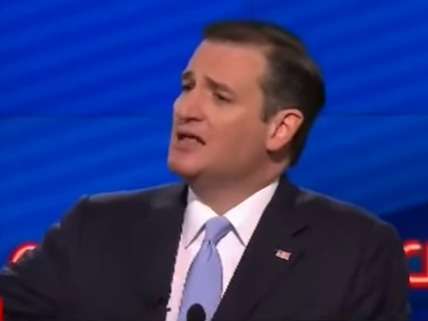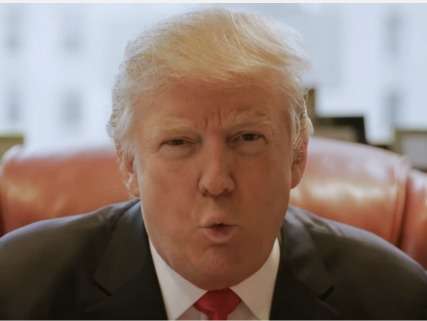Trump and Cruz on War and Peace
Trump is more skeptical of foreign intervention, but both promise to boost military spending and destroy ISIS.

In my column this week, I argue that Ted Cruz's fitful fidelity to the Constitution makes him less scary as a presidential candidate than Donald Trump, who except for the Second Amendment does not seem to know or care what the Constitution says. But there is at least one way in which Trump looks better than Cruz: He seems more wary of foreign military action, although both candidates are more cautious than hyperinterventionists like Hillary Clinton and Marco Rubio, and both want to increase so-called defense spending while waging all-out war on ISIS.

While Trump initially supported the wars in Iraq and Libya, he now says they were disastrous mistakes, for essentially the same reasons offered by Rand Paul, who was the least interventionist of the Republican presidential candidates until he withdrew from the race in February. Far from enhancing U.S. security, Trump says, overthrowing Saddam Hussein and Muammar al-Qaddafi sowed chaos, creating conditions that empowered terrorist organizations such as ISIS.
"George Bush made a mistake," Trump said at the February 13 GOP debate. "We can make mistakes. But that one was a beauty. We should have never been in Iraq. We have destabilized the Middle East….They lied. They said there were weapons of mass destruction. There were none."
Trump is also unequivocal about the folly of intervening in Libya's civil war. "We would be so much better off if Qaddafi were in charge right now," he said during the February 25 debate. "If these politicians went to the beach and didn't do a thing, and we had Saddam Hussein and if we had Qaddafi in charge, instead of having terrorism all over the place, we'd be—at least they killed terrorists, all right? And I'm not saying they were good, because they were bad. They were really bad. But we don't know what we're getting. You look at Libya right now, ISIS, as we speak, is taking over their oil. As we speak, it's a total mess."
On the whole, Trump says, toppling Middle Eastern dictators has senselessly killed thousands of people and consumed trillions of dollars. "We've done a tremendous disservice to humanity," he said during the December 15 GOP debate. "The people that have been killed, the people that have wiped away, and for what? It's not like we had victory. It's a mess. The Middle East is totally destabilized. A total and complete mess."
Trump applies the lessons of Iraq and Libya to Syria. "I don't like Assad," he said at November 10 debate. "Who's going to like Assad? But we have no idea who these people [are], and what they're going to be, and what they're going to represent. They may be far worse than Assad. Look at Libya. Look at Iraq."
Cruz has not been nearly as critical of the Iraq war. When asked about the invasions of Iraq and Afghanistan during his 2012 Senate campaign, he said, "I think they made sense to go in, and we stayed there for too long." But Cruz has been highly critical of the intervention in Libya, and he says that experience should make us wary of taking sides in Syria's civil war. Here is how he put it during the December 15 debate:
Let's go back to the beginning of the Obama administration, when Hillary Clinton and Barack Obama led NATO in toppling the government in Libya. They did it because they wanted to promote democracy. A number of Republicans supported them. The result of that—and we were told then that there were these moderate rebels that would take over. Well, the result is, Libya is now a terrorist war zone run by jihadists.
Move over to Egypt. Once again, the Obama administration, encouraged by Republicans, toppled Mubarak who had been a reliable ally of the United States, of Israel, and in its place, Morsi and the Muslim Brotherhood came in, a terrorist organization.
And we need to learn from history. These same leaders—Obama, Clinton, and far too many Republicans — want to topple Assad. Assad is a bad man. Qaddafi was a bad man. Mubarak had a terrible human rights record. But they were assisting us—at least Qaddafi and Mubarak—in fighting radical Islamic terrorists.
And if we topple Assad, the result will be ISIS will take over Syria, and it will worsen U.S. national security interests. And the approach, instead of being a Woodrow Wilson democracy promoter, we ought to hunt down our enemies and kill ISIS rather than creating opportunities for ISIS to take control of new countries.
Cruz and Trump both promise to destroy ISIS. Cruz's war features lots of bombs, while Trump's includes murdering the families of terrorists. Both are willing to use torture, although Trump is keener on it, promising waterboarding and "a hell of a lot worse." Cruz has said U.S. ground troops "should always be the last step," but he does not rule them out. Trump says defeating ISIS might require "20,000 to 30,000" American troops.
Cruz and Trump are both leery of nation building (just like George W. Bush!). "When it comes to defeating ISIS," Cruz says, "we should use overwhelming force, kill the enemy, and then get the heck out. Don't engage in nation building." Trump says "we can't continue to be the policeman of the world," and he wonders why the U.S. continues to defend wealthy countries that are perfectly capable of defending themselves.
Yet both want to expand the U.S. military budget, which is already as big as those of the next seven biggest spenders combined. "We must rebuild our military," Cruz says, while Trump promises to "build the military stronger, bigger, better" than any other candidate.
Cruz's national security advisers, whom he announced yesterday, include Frank Gaffney, Andrew McCarthy, Michael Ledeen, and Elliott Abrams, none of whom is known for restraint in foreign affairs. Gaffney and McCarthy both are worried about the menace supposedly posed by Shariah law within the United States. In 2009 Gaffney claimed there was "mounting evidence that the president not only identifies with Muslims, but actually may still be one himself." Gaffney also has been known to question whether Obama was actually born in the United States.
Think those advisers are scary? Wait until you see Trump's national security team. "I'm speaking with myself, number one, because I have a very good brain," he said on Wednesday. "My primary consultant is myself, and I have a good instinct for this stuff."
Editor's Note: As of February 29, 2024, commenting privileges on reason.com posts are limited to Reason Plus subscribers. Past commenters are grandfathered in for a temporary period. Subscribe here to preserve your ability to comment. Your Reason Plus subscription also gives you an ad-free version of reason.com, along with full access to the digital edition and archives of Reason magazine. We request that comments be civil and on-topic. We do not moderate or assume any responsibility for comments, which are owned by the readers who post them. Comments do not represent the views of reason.com or Reason Foundation. We reserve the right to delete any comment and ban commenters for any reason at any time. Comments may only be edited within 5 minutes of posting. Report abuses.
Please to post comments


Does anyone ever ask these jokers what they think the annual figure for Defense spending should be? That is, can they quantify what they mean when they say "increase" defense spending? It would be like asking Sanders to quantify what he thinks would be the "fair share" for "rich" people to be taxed.
The answer is "more".
How do you calculate the right amount of defense spending? Where are the price signals? I say privatize defense. Let's see how much people are willing to pay out of pocket. Whatever that is, is the right amount to be spending on defense. And remember that any arguments about underspending can also be used to argue for social security (since people tend to underspend for retirement).
And trade wars never escalate into actual those boots on the ground icky wars, amiright?
Well, it's been a while. So far we haven't invaded Canada over softwood lumber disputes.
This is also a TERRIBLE Friday Funnies.
If you can't laugh at a headline like, "Trump and Cruz on War and Peace" then you have lost your sense of humor.
NEEDZ MOAR LABELZ!!!!!
Hey, i cracked a smile.
Almost as funny as Walter Block's Libertarians for Trump group.
"...the U.S. military budget, which is already as big as those of the next seven biggest spenders combined."
I spout factoids like this all the time, but even they don't go far enough -- because half the spending of those next seven spenders if from allies, not enemies. IOW, the USA spends twice as much as Russia and China combined!
It actually used to be more than the next 15 biggest combined quite some time ago, and then the next 10 combined a few years back, so now that it's only the next 7 combined you can see what dire straits we are in militarily.
Not sure about China, but service in the Russian military is mandatory and I don't think it's a very lucrative paying job. I'd like to see some military spending cuts, and there is a lot that can be cut, but I don't see a problem with spending more than another country to keep the military technologically superior and voluntary.
Personally have never understood these "we spend more than x other countries on defense" arguments. That tells exactly nothing on what the proper level of spending for the U.S. should be.
Trump and Cruz on War and Peace
"Leo Tolsty is a totally overrated clown who speaks without knowing the facts. Leo Tolsty works really hard but just doesn't have it ? a total loser! I like books that don't take 1000 pages to finish, okay?"
The Trump-lover hears this, softly chuckles, and then somehow rationalizes it.
"I have a very good brain"
A sentence that someone with a 'very good brain' has ever said in human history.
But we all know that the hair and the hat are really running the show.
Destroying ISIS sounds like a fine idea. I'm sure it will go about as well as destroying Al Qaeda and the Taliban has.
Trump was given the pop-up version with extra coloring book pages. He says it was elegant
"Think those advisers are scary? Wait until you see Trump's national security team. 'I'm speaking with myself, number one, because I have a very good brain,' he said on Wednesday. 'My primary consultant is myself, and I have a good instinct for this stuff.'"
Scary? Actually, Sullum's article makes the case that Trump really does have pretty good instincts on this, at least relative to the other candidates. That is, I concede, a pretty low bar.